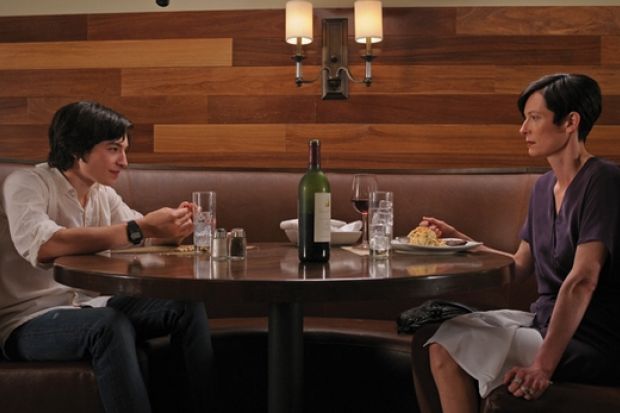We Need To Talk About Kevin
Directed by Lynne Ramsay
Starring Tilda Swinton, Ezra Miller and John C. Reilly
Released in the UK on 21 October
At the start, two white curtains gust in the wind from an open door, like Halloween ghosts. Outside in the garden, the jets of sprinklers carve white into the darkness, like fans; like fingers, like hands.
Lynne Ramsay's adaptation of Lionel Shriver's novel is a disconnected experience. We piece together the story through the memories of Kevin's mother, Eva (Tilda Swinton), but while the book reveals its dreadful truths through the careful, controlled framework of Eva's letters to her estranged husband Franklin, the film is chopped into smaller chunks. Scenes from Kevin's childhood and teenage years are smashed together across time and space. Past and present bleed into each other through overlapping sound and picture. Close-ups of an eye, a lock, a map and an arrow cut into Eva's consciousness, recurring images that build gradually into a fuller picture. And shots blur swimmingly, like a fever dream: light through a rainy car window, a hospital corridor, a haunted face. Eva rarely smiles, but she greets the Jehovah's Witnesses at her door with something like blessed relief: I'm going to hell, she tells them, grateful for the certainty. In many ways, she's already there.
The casting is perfect. We watch Kevin grow from screaming baby to sulky toddler to languid teen (Ezra Miller), his features evolving into a precise, uncanny echo of his mother's angular bone structure. From the moment of his birth they duel, locked in duality. They face off across the nursery floor, in the driver and passenger seat of a car, and finally across a prison table.
Like Eva, Kevin straddles and unsettles boundaries. She looks half-dead, barely alive, sometimes hardly human, with her skin stretched tight over her skull. Kevin dutifully plays the all-American son with his easily duped dad, Franklin, but stripped to the waist he's as poised and as coiled as an East Asian martial artist. He uses his adolescent masculinity to shock and unnerve Eva, but his full lips and messy dark hair are sensually feminine. She catches his cunning in occasional glances, and he holds her gaze steadily, knowing she sees both his true persona and part of herself there, too. As in the novel, Franklin is a marginal presence, and their daughter, Celia, little more than a sad footnote. Kevin and Eva are the central couple.
Ramsay shows us the human body in unlovely detail. Her camera stares at reflections in an eye, the bunions on Eva's feet, the bitten fingernails Kevin spits from his tongue. We are reminded that the human skin is just a fragile membrane, keeping the blood and organs in. Primary red and yellow, the colours of blood and bile, creep into the corner of every scene. Mustard, strawberry jam. A scarlet stuffed toy, an orange car indicator. Canary-yellow police tape, a crimson fire engine. Stop signs and amber lights. We are trapped in Eva's perpetual present, a sleepless, garish hell. The only glimpse of green is outside in the garden, where Kevin, wearing a Robin Hood hat, is now shooting arrows with frightening intensity and accuracy, sending them thudding into a bullseye.
Yet this is not a horror film or a gory spectacle. Ramsay releases fragments of the story and lets us fill in the gaps; her scenes are shorthand, not full sentences. We see a bottle of drain cleaner, a mouth crunching a peeled lychee, a stained Q-tip delicately dabbing an empty socket. We don't need to be shown exactly what happened to Celia's eye. We don't need to be told exactly what crime Kevin commits in the school gym. There are oblique references to Gus Van Sant's Columbine film, Elephant (2003), and the Boomtown Rats song I Don't Like Mondays. We can guess the rest.
In the novel, Eva's travel company is A Wing And A Prayer. In the film, all promise of salvation dropped, it's renamed simply Escape, but that possibility, too, is denied her. She walks out of the prison, but her whole world is a cell. Kevin, meanwhile, remains locked up, but this is surely a breakout role from Ezra Miller: with Heath Ledger gone, we finally have another actor who could play The Joker.
Register to continue
Why register?
- Registration is free and only takes a moment
- Once registered, you can read 3 articles a month
- Sign up for our newsletter
Subscribe
Or subscribe for unlimited access to:
- Unlimited access to news, views, insights & reviews
- Digital editions
- Digital access to THE’s university and college rankings analysis
Already registered or a current subscriber? Login
